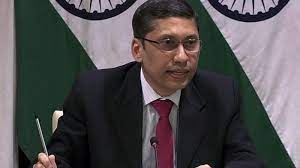On Pakistan's reported 'rejection' of Union Home Minister Amit Shah's 'PoK is ours' remark in the Lok Sabha, MEA spokesman Arindam Bagchi told the regular weekly briefing: "You really expected some other response? ...I don’t think I need to really reiterate our position on PoK.
I don't need to clarify the Home Minister's statement in the Parliament. Our position on Pok is very clear, we consider it a part of India and we certainly see no reason to change our statement..."
When asked about Khalistani terrorist Gurpatwant Singh Pannun's threat of an attack on Parliament on or before December 13, the MEA said that India always takes threats seriously. However, it was also added that they didn't want to "amplify or give credence to extremists who make such threats".
"We do take threats seriously. We are caught in a bind here. I don't want to amplify or give too much credence to such extremists who make threats. We have taken up this matter with the US and Canadian authorities. Extremists and terrorists have the tendency to want media coverage on an issue," MEA spokesman Arindam Bagchi said.
On the prosecution of SFJ chief Pannu,
Bagchi said, "He is wanted by our agencies for violation of the law and there is a process under which we seek assistance and that they are prosecuted, depending on whether the crime is committed.
"In our case, I think requests have gone through detailing the kind of crimes that he is responsible for, in India...We have also flagged concerns to our partners regarding any threats made by extremists or terrorists against India or India diplomats...".
"Those who are wanted in India to face justice for criminal and terrorist activities, we would like them to come to India and face our legal system, but I cannot comment on developments that are taking place in Pakistan," MEA spokesman Arindam Bagchi said.
"People overstate that China is the reason India, US are together. I don't believe that," says US envoy Garcetti
"When I think about the US-India relationship, a lot of people overstate that China is the reason we are together. I don't believe that at all. I think it's one of the most important, pressing things we talk to and we rely on," Eric Garcetti said at a panel discussion at the Carnegie 'Global Technology Summit' in New Delhi.
The Ambassador has likened India-US ties to a romantic relationship which is currently in the "dating" phase.
Speaking about the relations between the two countries, he said, "To make this romantic, it is like our Facebook status for a long time was 'it's complicated'. Now we are dating."
"In time we will realise that maybe we have moved in together and we might not like each other's habits, like why do you leave the towel on the floor... we are figuring out how and where this goes... there is a strong desire in our hearts, it is personal," Garcetti joked.
"India loves what I call geometric diplomacy. Triangles, quadrilaterals because multilateral space hasn't been so friendly always to India, because when it gets too big, India gets lost; and bilateral comes with too many conditions," Garcetti said, as he spoke of the many trilateral and quadrilateral alliances that both countries are a part of.
He also spoke of the challenges in India-US relations given that so "broad" and "deep" is the capacity of the job at hand. Citing an example, Garcetti said, "When Modi came to the state dinner in Washington, there were three to five deliverables and that's a strong takeaway. In the week before the visit, we were ploughing through 123 different deliverables. 123!"
Further, to a question on economic engagements between India and the US, Garcetti asserted that the two countries are still not doing enough business with each other and that America's economic engagement with India is just two per cent of their economy.
"If we're going to be just frank with each other, just 2 per cent of our economy has interaction with India. We're seeing FDI not yet flowing in the way that India wants or that we would want. From China, it's going to Vietnam, it's going to Mexico."
"And I think there's still some really good conversations my Indian friends are having, but what does it take not to make one-off exceptions for companies, but to fundamentally restructure how we tax inputs,
so we can have more outputs when it comes to manufacturing because this (India) is still the highest tax in any major economy in the world. And I get why it's not a criticism. There isn’t enough taxpayer base. So how do you raise revenues when you have a shortfall?" he said.
ends










No comments:
Post a Comment